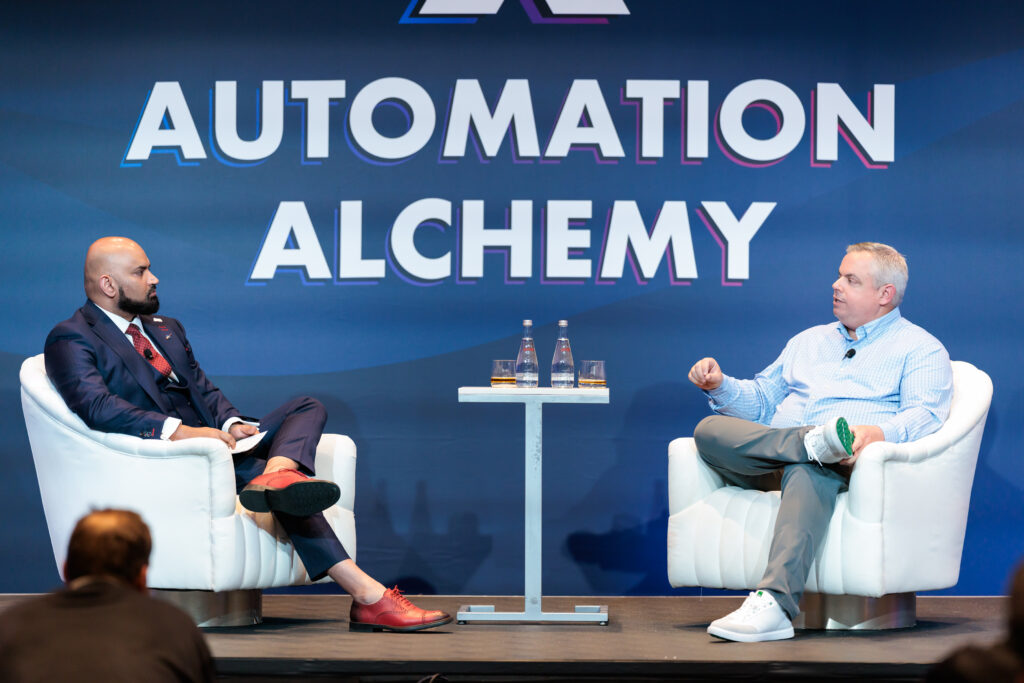From Pitfalls to Profits: Customer Insights From Kaseya DattoCon 2024

During Kaseya DattoCon 2024, held at the historic Fontainebleau hotel in Miami Beach, the “From Pitfalls to Profits” fireside chat offered a deep dive into how a next-generation professional services automation (PSA) tool can transform challenges into opportunities for growth. Led by Kevin Sequeira, General Manager of Kaseya’s PSA Suite, and Nick Recker, Founder and CEO of Blue Alliance, this session provided attendees with valuable insights and actionable strategies for harnessing PSA to drive business success.
Building a platform for success
Nick shared his journey of founding Blue Alliance, an operator-led MSP investment group that unites high-functioning MSPs across the country. Aiming to empower MSPs to retain their unique identities while benefiting from shared resources, Blue Alliance allows MSPs to operate independently under their own brands. Nick emphasized the importance of “entrepreneur-led” MSPs, explaining that his goal was to create a group where MSPs could achieve economies of scale while preserving the local touch and agility that clients value.
Nick underscored the crucial role that a PSA tool, particularly Autotask, played in building this cohesive platform. He highlighted the process of consolidating diverse PSA systems, which enabled standardization across the board. This approach led to operational freedom and improved efficiency for Blue Alliance MSPs, fostering a collaborative network capable of “punching above its weight class.”
Lessons learned: Avoiding common M&A pitfalls
Nick shared some early challenges Blue Alliance faced through rapid growth, acknowledging initial mistakes that provided valuable lessons:
- Invest in training and standardization early: The lack of a defined structure for their PSAs across brands led to inconsistencies in system use and created miscommunication and inefficiencies.
- Role-based security: Incorrectly assigning user roles caused operational snags and confusion. Nick stressed the importance of tailoring roles to clarify responsibilities and enforce best practices.
- Consistency in time reporting: Allowing top performers to bypass time capture requirements led to inconsistent profitability calculations. Blue Alliance adopted a “moment of truth” approach, setting strict standards for PSA use to streamline workflows.
Kevin added that MSPs often blame the PSA tool when issues arise, but he emphasized that effective setup and full adoption of its features are essential to unlocking a PSA’s potential. Blue Alliance embodies this principle with a “build it and they will come” philosophy. While they don’t require MSPs to switch to Autotask, all members have ultimately chosen to make the move. After joining Blue Alliance and experiencing how seamlessly the Autotask-powered processes run, MSPs see firsthand the advantages over their previous systems, often opting to transition from ConnectWise to Autotask. This voluntary shift underscores the impact of proper setup and integration, showcasing Autotask’s value within the Blue Alliance model.
Transparency and data governance
One of Blue Alliance’s standout strategies was its rigorous approach to data governance. Nick noted that achieving consistent setups for contracts, renewals and billing was critical. This uniformity allowed Blue Alliance MSPs to maintain local independence while benefiting from standardized processes at the corporate level that boosted profitability. Nick also championed transparency with engineers, explaining that sharing real-time data and tying it to compensation led to more engaged, goal-oriented teams.
Having helped numerous MSPs transition to Autotask, Nick shared valuable insights gained from nearly a dozen migrations. A common mistake MSP owners make is trying to fit their old processes and data into Autotask without adapting to the changes needed to overcome their current challenges — a strategy both Nick and Kevin have seen fail. Nick stressed the importance of investing in a thorough implementation, listening to expert guidance and carefully selecting the data to migrate from the old system to Autotask.
Kevin echoed the importance of data quality, emphasizing that inconsistent data can hinder accurate profitability measurement and obscure operational insights.
Embracing AI: The future of PSA
A key highlight of the session was the role of AI in enhancing a PSA’s value. Nick offered a balanced perspective, stating that “AI makes smart people smarter and dumb people dumber.” For MSPs already focused on quality service, AI will empower them to work even more efficiently. AI-driven insights, he explained, will assist MSPs in triaging tickets and anticipating client needs, ultimately improving service delivery and client satisfaction.
Final takeaways
The fireside chat concluded with Kevin and Nick encouraging attendees to view PSA not just as a tool, but as a strategic asset. By implementing a robust, AI-powered PSA like Autotask, MSPs can cultivate a culture of continuous improvement and efficiency. Nick advised MSPs to adopt a mindset of “living like you’ve already gotten there,” underscoring the importance of aligning daily operations with long-term goals.
This insightful discussion provided a roadmap for MSPs aiming to scale their operations, strengthen client relationships and drive profitability — all with the support of a next-gen PSA.
Interested in seeing firsthand why Autotask is trusted by more than 10,000 organizations? Get a live demo with an Autotask expert to learn more.
